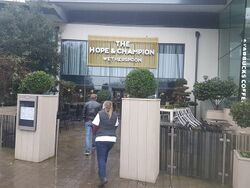Alcohol at motorway services

Between 1961 and 1994, and between 2008 and 2013, motorway service areas were forbidden from selling alcohol. Many people believe that this rule still applies, but it does not.
Service stations are allowed to apply for a licence to sell alcohol but often they have to stop people from consuming it anywhere on their premises. This leads to signs being displayed which ban drinking alcohol "indoors and outdoors", leading to sarcastic social media posts.
Many service areas (both on and off the motorways) will sell alcohol in their shops. The motorway service area operators will tend to keep this quiet, knowing that promoting alcohol on the motorway will cause concern. The forecourt operators (who are more used to running petrol stations in town centres) are not so reserved, and will actively promote alcohol even at their motorway sites.
Motorway Pubs
Famously, Beaconsfield services has a full JD Wetherspoon pub. It opened in 2014 and trades mainly on the food Wetherspoon serve, but the alcohol is available and they aren't expected to be any more cautious than any other pub by a main road might be.
Moto introduced a pub-themed restaurant called Bar & Grill in 2015. This was mainly focused on selling food, but was trying to use the styling of a traditional pub. It closed in 2023.
PizzaLuxe opened two cocktail bars in November 2021, at Cambridge and Peterborough. These offered a made-to-order cocktail menu and a full-service bar. They were very open that they intend to turn the service areas into destinations, but they closed in 2023.
The idea of a pub on the motorway isn't something totally new either. 'The Friar Tuck-In' opened at Trowell services in 1975, under the much stricter regulations at the time. This was entirely alcohol-free and was aimed at families as well as lorry drivers. It was designed in response to concern that many drivers, especially in lorries, had been bringing their own alcohol with them and drinking it during their breaks. The idea was short-lived and very little has been written about it.
Legal Situation
The earliest motorway service areas were allowed to apply for a table licence. Newport Pagnell was the first to try, but the local licensing authority ruled against it, which set a precedent.
Only a year later, the licensing bill of 1961 outlawed the sale of alcohol on land that the government owned next to motorways, covering service stations. This did create a loophole where operators could build a hotel on their own land next door to their service area, and that hotel could then operate without government legislation.
Meanwhile, one government report (dated 1966) found that the lack of alcohol was harming the success of the motorway restaurants, but it predicted that "eventually there will be a different social outlook" on drinking before driving.
When the motorway service areas were all sold off in 1992, a new rule was required to keep the alcohol ban going. When the regulations were rewritten again in 1998, that special rule was forgotten. It's understood that this was a total oversight and wasn't supposed to happen, but after a while operators started applying for alcohol licences.
The updated 2008 regulations banned the "sale and consumption" of alcohol again, but this only applied to new facilities on motorways. That was one of many regulations to be removed in 2013, meaning alcohol is permitted once more.
These regulations have never applied to service areas on A-roads. Many Little Chef restaurants, for example, were licensed, and their menu included a note reminding people not to drink and drive. Pubs have played an influential role in the history of some A-road service areas, as they became important landmarks in the pre-motorway era and some continue to be positioned at key junctions today.
The Hope & Champion's status as a motorway service area created an unusual situation where it could remain open during parts of the COVID-19 pandemic, where all other pubs in England faced a 10pm curfew.